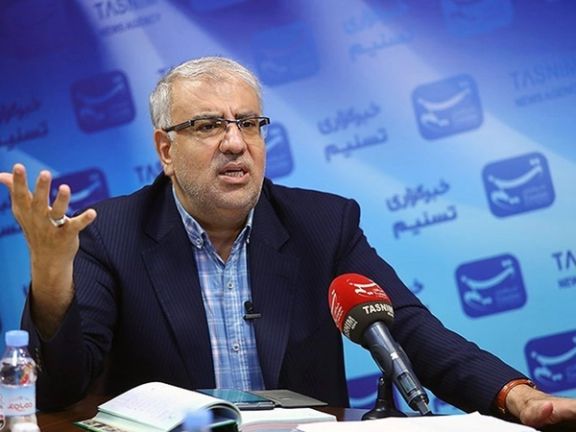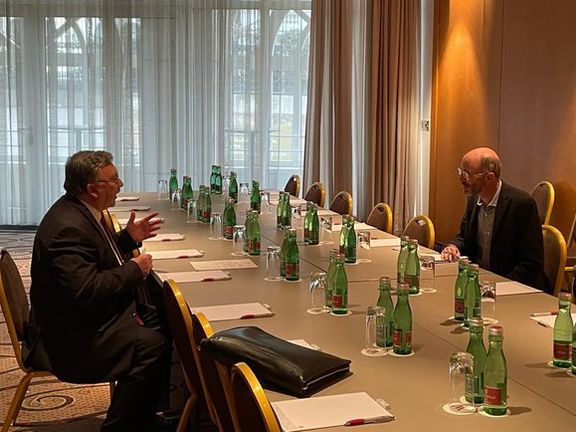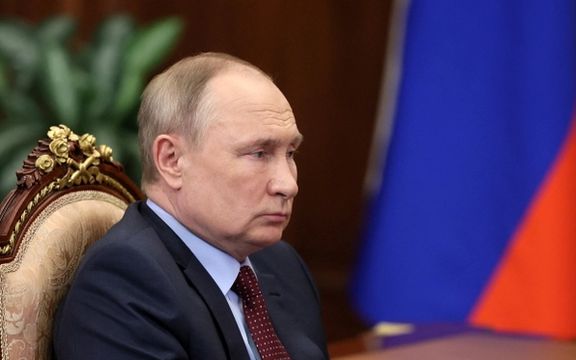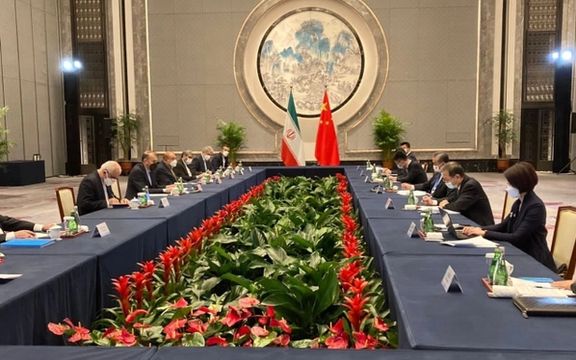Minister Says Iran Can Restore Oil Output Quickly After A Nuclear Deal

Iran’s oil production can reach its maximum less than two months after a nuclear deal is reached; Oil Minister Javad Owji was quoted as saying on Thursday.

Iran’s oil production can reach its maximum less than two months after a nuclear deal is reached; Oil Minister Javad Owji was quoted as saying on Thursday.
"As soon as nuclear negotiations in Vienna are concluded, we can reach our maximum oil production capacity and exports in less than one or two months," Owji was quoted as saying by the official oil ministry news agency SHANA on Telegram. "However, we are in no way tied to waiting for the nuclear talks."
However, Iran’s ability to pump more oil is limited because of lack of investments in the oil and gas sector over the years. Owji said in November that the country needs to invest around $160 billion to upgrade its infrastructure and boost production.
Recently, Iran’s parliament speaker indicated that production cannot be boosted to 4 million barrels a day, while domestic production is already around two million barrels. Iran plans to increase output to 3.8 million barrels per day if sanctions are lifted.
Iran sits on the world’s fourth-largest oil reserves, but its crude output has dropped since the imposition of US sanctions on its economy in 2018, when then-US President Donald Trump exited the 2015 nuclear deal.
Negotiations to revive the pact have been going on for 11 months in Vienna, and diplomats are now believed to be in the final stage of talks. The United States will lift oil sanctions at least temporarily until the two sides fully retore the nuclear agreement, JCPOA.

US chief envoy in Iran nuclear talks, Rob Malley, is preparing to lift sanctions imposed on Iranians tied to terrorism, a former State Department official has revealed.
Gabriel Noronha, Former Special Advisor for the Secretary's Iran Action Group in the Trump administration in a series of tweets on Wednesday quoted State Department, National Security Council and European Union unnamed officials as having authorized him to reveal that Malley is preparing to make concessions to Iran that are damaging to US national security.
Noronha said these current officials hope that by revealing details of the concession they hope to prompt the US Congress to act “to stop the capitulation.”
He also charged that Mikhail Ulyanov, Russia’s chief envoy in the talks, has been the main architect of the deal. Noronha said that his contacts said, “What is happening in Vienna is a total disaster.”
Earlier, “concessions and other misguided policies have led three members of the US negotiating team to leave,” Noronha said in one his tweets.
Republican Senator Jim Inhofe tweeted later that “There is no limits to what @USEnvoyIran will offer Tehran to return to the failed nuclear deal.”
Noronha further said, “US has promised to lift sanctions on some of the regime’s worst terrorists and torturers, leading officials in the regime’s WMD infrastructure, and is currently trying to lift sanctions on the IRGC itself.”
Iran has long demanded that all post-2018 sanctions should be lifted – not just nuclear related sanctions. There are many terrorism and human rights related sanctions. The Biden Administration has insisted that it is willing to lift only nuclear sanctions.
Following Noronha’s revelations, a State Department spokesperson responded to Iran International’s questions, saying, “We are in the final days of a complex negotiation. We are prepared to lift JCPOA-related sanctions in order to end the nuclear and regional crises prompted by our withdrawal.Beyond that, we are not going to respond to specific claims about what sanctions we would be prepared to lift as part of a mutual return to full implementation of the JCPOA.”
According to Noronha, President Biden’s team “is preparing to rescind the Supreme Leader’s Office Executive Order (E.O. 13876) as soon as coming Monday, and lift sanctions on nearly every one of the 112 people/entities sanctioned…”
Top Islamic Republic officials facing serious accusations or evidence of involvement in acts of terrorism are also apparently slated to be de-listed.
Reuters reported last month reported some details about a draft agreement being prepared in Vienna, which did not mention these details. It appeared that the US was moving cautiously, with gradual lifting of economic sanctions.
If what Noronha has reported based on information that he says he has received from current officials is true, Iran would achieve almost everything it has been demanding in 11 months of negotiations.
Republicans and some Democrats in Congress have warned the Biden Administration about making concessions to Iran. It is not clear how they would act to demand accountability from the White House.

Fear of uncertainty and possible legal entanglements have made global banks jittery about dealing with Russia, similar to Iran's experience with sanctions.
Faced with an unprecedented level of sanctions on Russia, banks are taking a dim view of business with all Russian entities and dropping clients if there is even a slight doubt on their ties to that country, Reuters quoted bankers and lawyers as saying.
While European and North American governments have introduced serious banking and other business sanctions, countries in Asia and Elsewhere are introducing their own restrictions.
Sanctions experienced by Iran went a bit farther than those announced against Russia, such as cutting off all banks, instead of a select group, and the central bank from the global SWIFT. But the overall psychological and legal impact appear not be too different.
While global banks have extensive experience with sanctions and have invested billions of dollars in compliance programs in recent years, the curbs on Russia are unmatched in their scale, speed and complexity and may yet grow, said executives. Russia was a much larger financial player before the sanctions than Iran ever was.
To avoid falling foul of the rules and having assets and capital ensnared by new curbs, banks are adopting extreme caution in all of their dealings with Russian entities, actions that will likely exacerbate global trade disruptions, said bankers and lawyers.
The United States alone fined banks billions of dollars for breaching its OFAC (Office of Foreign Asset Control) restrictions since 2010. BNP alone was fined $8.9 billion in 2014, while Commerzbank and HSBC were also fined in billion-dollar figures. From 2010-2019, the US took action against 32 banks and all paid penalties.
Many of these cases were related to Iranian sanctions violations, which has made international banks extremely careful in their dealings.
A senior Hong Kong-based Asia trade finance banker with a global lender told Reuters that his compliance colleagues are asking more questions even if a financing deal involves a non-sanctioned Russian entity, directly or indirectly.
The issue is not just current sanctions, but what may still come. "It's not just managing risk from the existing sanctions, but also thinking about what more could possibly happen on that front," an Asian banker told Reuters. "No one would like to sign a billion-dollar trade finance deal only to be told a week later that the entity in Russia has also been added to the sanction list."
There is also the danger of aftereffects even when sanctions are removed. Iran experienced this syndrome when it resolved its nuclear issue with world powers in 2015 and international sanctions were lifted.
From 2016-2018 when most economic sanctions were removed, Iran had a hard time to get major deals and joint ventures. While the country needed tens of billions of dollars in investment, it was able to secure just a few billion dollars.
The fear that a regime is unpredictable and sanctions can be reimposed for new unacceptable actions, will keep the financial sector and corporations away from a country which has emerged from sanctions.
Charlie Steele, partner at Washington-based consultancy Forensic Risk Alliance and a former US Treasury Department sanctions attorney told Reuters, "Banks generally, and certainly the global banks, often tend to be very cautious and conservative with respect to sanctions, especially U.S. sanctions.”
With reporting by Reuters

A Russian-flagged ship targeted by US sanctions and suspected of carrying Iranian oil is heading to Malaysia, shipping data showed on Monday.
The Linda, a crude oil tanker identified in a US Treasury document detailing sanctions against Russia, was in the Indian Ocean and was expected to arrive at Sungai Linggi port on Malaysia's west coast on Sunday, according to data from ship tracking website MarineTraffic.com.
It was not immediately clear whether authorities in Malaysia plan to allow the ship to anchor. Its marine department and foreign ministry did not respond to requests for comment.
US advocacy group United Against a Nuclear Iran (UANI), which monitors Iran-related tanker traffic through ship and satellite tracking, said Linda was transporting Iranian oil transferred from another ship at sea on Jan. 30.
The vessel had loaded crude oil from an Iranian port 10 days prior to conducting the transfer to Linda, UANI's chief of staff Claire Jungman told Reuters, citing satellite data.
The destination of the oil was not known but it could be transferred to another ship off Malaysian or Singapore waters, Jungman said.
Transferring illicit Iranian oil from one tanker to another has been taking place in Mlaysian waters.
According to the United States, Linda is owned by PSB Leasing, a unit of Russian lender Promsvyazbank, which has also been hit by international sanctions.
French authorities on Saturday seized another ship, Baltic Leader, that they said was owned by PSB Leasing.
Reporting by Reuters

China's has boosted Iranian oil imports to record levels in recent months, exceeding a 2017 peak before the US imposed sanctions, tanker tracking data confirms.
Higher imports by China comes amid talks between Tehran and world powers to revive a 2015 nuclear deal that will lift US sanctions on Iranian oil exports. The talks have intensified in recent weeks.
Iran International reported in February that China’s customs grossly underreported its oil imports from Iran.
When the United States imposed full sanctions on Iran’s oil exports in May 2019, China continued to buy 100,000-200,000 bpd until the third quarter of 2020. Before the US presidential elections, reports emerged that Iran was shipping more crude to China and the volume steadily increased, reaching the current levels.
Throughout last year, major American business publications such as The Wall Street Journal and Bloomberg were reporting that China had substantially increased its oil imports from Iran, which could undercut Washington’s leverage in the nuclear talks.
Analysts say the return of Iranian oil will ease tight global supplies and cool crude prices that have touched $100 a barrel following Russia's invasion of Ukraine. But Iran excess production capacity is limited as it is already exporting more than one million barrels per day.
Chinese imports exceeded 700,000 barrels per day (bpd) for January, according to estimates of three tanker trackers, surpassing the 623,000 bpd peak recorded by Chinese customs in 2017 before former US President Donald Trump reimposed sanctions in 2018 on Iranian oil exports.
One tracker estimated imports amounted to 780,000 bpd in November-December on average.
US President Joe Biden's administration has so far chosen not to enforce the sanctions against Chinese individuals and companies amid the negotiations on reviving the 2015 deal.
Record Chinese purchases of Iranian oil would mean less supply will be available to Tehran's previous buyers like Indian and European refiners should the sanctions be removed, traders said according to Reuters.
It would also mean that cheaper Iranian oil will continue to crowd out rival supplies from Brazil and West Africa, they said.
When asked for a comment by Reuters, China's foreign ministry declined to go into details but reiterated that Beijing opposes Washington's long-arm jurisdiction and urges Washington to remove unilateral sanctions.
Iranian officials have boasted in recent weeks that they have substantially increased oil export and defeated US policy of ‘maximum pressure’ imposed by former president Donald Trump.
A US State Department spokesperson said Washington is aware of China's Iranian oil purchases and has broached the subject with Beijing.
“China is an important trading partner for Iran, so, of course, our discussions with China on how best to get a mutual return to compliance with the JCPOA include discussions of sanctions enforcement," said the spokesperson, referring to the 2015 nuclear deal formally known as the Joint Comprehensive Plan of Action.
Demand From Teapots
At the forefront of China's buying are its independent refiners, or "teapots", who, traders said, are being enticed by the discounted prices, especially as their domestic refining margins got pinched under tight regulatory scrutiny.
"We're seeing more plants taking Iranian oil, because they are cheaper," a China-based executive involved in the business told Reuters, referring to the independent refiners.
Traders said January Iranian cargoes were transacted $5 a barrel below benchmark Brent LCOc1. Those prices were steady versus late 2021 but more attractive against competing supply from Brazil that was priced at $7 premium over Brent, they said.
Consulting firm Petro-Logistics, which tracks oil flows, said Iran's crude exports surged in December to over 1 million bpd, the highest level in almost three years.
"Iran's oil exports are mostly going to China, often through convoluted routes and transshipments, with small volumes going to Syria each month," said CEO Daniel Gerber.
Petro-Logistics sees total Iranian oil exports at close to 800,000 bpd in January and 700,000 bpd in February. But OilX, another data analytics firm, pegged Iranian exports at more than 1 million bpd for both January and February.
Iranian officials recently confirmed that they offer discounts to customers.
If the 2015 nuclear deal is revived, Iran is expected to divert sales away from the Chinese independent refiners, but the Islamic republic is unlikely to turn off the tap to these customers, source of more than $20 billion in revenue over the past two years.
"Iran may not have the full confidence how long the new deal could last. Chinese teapots have proven an essential outlet during the worst times and Iran would want to keep that channel open," said the China-based oil sector executive.
With reporting by Reuters

Iranian media and pundits say the newly found Chalous gas field in the Caspian Sea could not in time supply gas to Europe, if Russian shipments are sanctioned.
United States and European sanctions on Russia are far milder than against Iran, with oil and gas flowing to the West. While Russian gas exports to Europe via Ukraine continued normally Monday, financial sanctions on Russia and moving the Champions League soccer final have prompted some Iranian commentators to point out that Iran cannot move into the breach if Europe were to bar Russian gas.
Shargh newspaper wrote Monday that it would be wrong to overplay Iran's potential for replacing Russia in European markets. The reformist newspaper informed readers that Iran could not supply LNG (liquefied natural gas) given a lack of infrastructure – although Russian gas is supplied mainly by pipeline.
Iran needs foreign investment and technology to develop gas infrastructure, which has been difficult given years of international and United States sanctions. Iran and Russia hold 37 and 32 trillion cubic metres (tcm) of the world's proven gas reserves, while they respectively produce 250 and 638 billion cubic meters (bcm) of gas annually while respectively consuming 233 and 411 bcm domestically.
One of Tehran’s main aims is talks with world powers over restoring the 2015 nuclear deal - which US President Donald Trump withdrew from in 2018 – is to see lifted draconian US sanctions. Total, the French energy major withdrew from a contract in the South Pars gasfield in 2018due to the US ‘maximum pressure’ sanctions, a contract that included LNG development, which could be important for Tehran’s worldwide exports.
"The truth is we can't do anything in this regard unless we solve our problems with the rest of the world, which requires the restoration of the nuclear deal (JCPOA) and deepening of relations with developed countries," Morteza Behrouzi, energy expert, also told Hamshahri newspaper in September 28.
The Chalous Basin reportedly holds 30 percent of developable natural gas reserves of all Caspian Sea littoral countries and could, following $19 billion in investment and the lifting of US sanctions, be well placed to supply Europe.
Even before the recent Ukraine crisis, some argued Russia has over the years tried to prevent Iran from exporting gas to Europe.
"Russia will not allow Iran to enter the European gas markets that easily and will use every tool at their disposal to prevent Europe from overcoming its dependence on Russian gas," Alireza Soltani, political economist told Entekhab website February 16. "They will prevent [Iran from exporting gas to Europe] but even if it’s to happen, they want it to happen under Russian control."
Iranian officials have long been warning of inadequate natural gas production that cannot keep pace with domestic consumption. Energy consumption is relatively high because of state subsidies to consumers − costing $45 billion a year- that put gasoline, electricity and other fuels at low levels compared to other countries. Iran's oil minister Javad Owji said November that to avoid becoming a net importer, Iran needed $160 billion of investments in its oil and gas industries in the coming years.